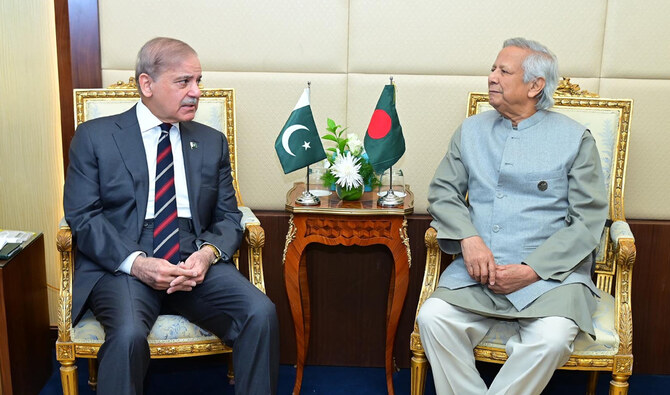DHAKA: The ouster of Bangladeshi Prime Minister Sheikh Hasina last August has opened a “new horizon of opportunities” for diplomacy with Pakistan, analysts, political parties and members of the public said, as Dhaka and Islamabad move to befriend each other after decades of acrimonious ties.
Pakistan and Bangladesh were once one nation that split as a result of a bloody civil war in 1971 that saw the part previously referred to as East Pakistan seceding to form the independent nation of Bangladesh.
Hasina’s government, like most before her, was hostile toward Pakistan but closely allied with Pakistan’s archrival and neighbor India, where she remains exiled, leading to strained ties between Dhaka and New Delhi. Exchanges with Islamabad, on the other hand, have started to grow.
The head of Bangladesh’s interim government, Nobel laureate Muhammad Yunus, has met Pakistani Prime Minister Shehbaz Sharif twice since taking office on Aug. 8 after Hasina fled the country following a popular, student-led uprising against her government. A high-ranking Bangladeshi military leader was also on a rare, week-long visit to Pakistan last month and there are widespread reports in regional media that the Pakistan army will be training Bangladeshi soldiers. Since December, Pakistani artists have been performing in Dhaka while Bangladeshi films have been screened at cinemas in Pakistan. Pakistani cargo ships have also begun to arrive at Bangladesh’s main Chittagong port for the first time since the 1971 war.
“The recent developments, in terms of bilateral exchanges with Pakistan, are a process to normalize the relationship,” Humayun Kabir, a former Bangladesh ambassador to the US, told Arab News.
There was no reason for India to view this development “negatively,” he said.
“We want the relationship between India and Bangladesh to be considered bilaterally, without being influenced by issues with Pakistan. Similarly, our bilateral relationship with Pakistan will continue independently of any issues with India,” Kabir added.
“I think this approach will create a dynamic in the relationship within the broader context of South Asia.”
Opposition political parties against Hasina’s Awami League party government — its archrival the Bangladesh Nationalist Party and the Bangladesh Jamaat-e-Islami, the largest Islamist party that was banned during her rule — were both optimistic about growing Pakistan ties.
“During the previous regime, Sheikh Hasina maintained close ties with only one country. In her own words, she said: ‘What Bangladesh has given to India, India will remember forever.’ This foreign policy was not the right approach,” said Matiur Rahman Akand, a spokesperson for the Jamaat-e-Islami.
Nawshad Zamir, the international affairs secretary of the Bangladesh Nationalist party, also welcomed that the two nations had “resumed normal relationship, like before.”
But the memory of the 1971 war for independence, which claimed the lives of many thousands of people, remains alive.
The nine-month-long war was triggered after a 1970 general election yielded a democratic victory for ethnic Bengalis in East Pakistan and Hasina’s father, Sheikh Mujibur Rahman, widely regarded as the father of the Bangladeshi nation, was expected to become the prime minister of the whole country. However, army generals ruling West Pakistan launched a military crackdown that turned into a civil war, with Rahman leafing the country to independence with help from India.
International organizations such as Amnesty International and Human Rights Watch have cited death tolls in the range of 300,000 to 500,000. The Bangladesh government puts the figure at three million.
Young Bangladeshis have not forgotten the bloodshed.
Mustafa Musfiq Talukdar, a student at Dhaka University, saw the current political environment as a chance for Bangladesh to become a regional leader but said “Pakistan first needs to deal with the 1971 issue.”
“In 1974, [Pakistan’s then prime minister] Zulfiqar Ali Bhutto came to Bangladesh and he kind of apologized personally, but it wasn’t something formal. So, we demand a formal apology from Pakistan for everything they did in 1971,” Talukdar told Arab News.
Tamim Muntaseer, a Dhaka-based researcher, said a “new horizon of opportunities with Pakistan” had been created after Hasina’s ouster.
“Bangladesh and Pakistan are aligned in terms of their regional economy, trade ... we should also consider people-to-people relationships,” he said.
“I am quite positive about the current developments between Bangladesh and Pakistan,” Tahmid Al Mudassir Choudhury, another Dhaka University student, told Arab News.
“I am not saying that we must forgive everything. Still, we can keep a good relationship with Pakistan ... We have seen that in cricket: Bangladeshi people supporting the Pakistani cricket team, and the people of Pakistan also supporting the Bangladeshi cricket team. We can celebrate those similarities, and this can bring the people of Bangladesh and Pakistan together.”
















